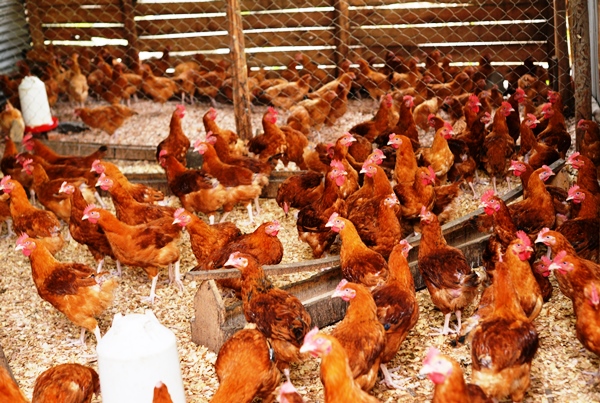
By Rwibasira Eugene
With the ongoing lockdown caused by Corona Virus, many farmers in Rwanda are facing challenges especially those that are engaged in Livestock and Poultry farming. The distribution channels of their produce have been disrupted by the coronavirus confinement. The most affected of all are those in poultry farming. They have nowhere to sell their eggs and meat. This is attributed to several factors among which are closure of hotels and restaurants, restricted movements of people during ‘stay at home’ period as well as food choices during this period.
For farmers who rear broilers, the maturity period of these birds is 45 days when they are ready for sell. Any extra feeding beyond this period does not fetch proportionate marginal returns. Instead it gives a negative trend. Previously, their market outlets were Hotels, Restaurants and supermarkets. Now that Hotels and Restaurants operate at their bare minimum, market for these products have hit their lowest and so are their prices which have since plummeted. With farmers who were rearing broilers (Just for meat) that matured during this period have nowhere to sell the meat as they have limited refrigeration services to hold the carcasses for some time. The fate of such farmers is nothing short of anybody’s imaginations. Worse still, the existing insurance schemes do not cover such risks during this period.
For those that have layers, they are also faced with the market of their eggs for the same reasons as for the broilers. They have been piling the trays of eggs all this time and prices have dived yet feed prices have remained constant or increased.
“I am stuck with piles of trays of eggs and not a single buyer is willing to take them even at a give-away price. I am running short of working capital to buy feeds and pay workers and banks are not willing to advance me with a loan.” said one GAKWANDI, a chicken farmer in Kigali.
On the other hand, those engaged in production of animal feeds are stuck with their products for the good reason that farmers are not buying feeds for fear of incurring losses. Their business have been naturally put on halt or staggering and therefore forced to slash production.
Those that have been buying the chicken products from supermarkets are no longer considering them essential items opting for other food stuffs to keep them surviving. This has compromised not only the business but also the nutritive benefits that people would otherwise get from consuming chicken meat and eggs. This is in terms of protein supply as they have high protein content which plays a very important role in sustaining our muscles, weight loss, healthy bones, stress relievers, and immunity boosting among others. The situation speaks volumes for the future of this business unless measures are put in place to bail it out.
In the absence of reliable market for their products, animal feeds producers, poultry farmers, vendors of poultry products are faced with cash flow bottlenecks to the extent that some of them have not been able to service their loan obligations.
This will have far-reaching economic impacts after the COVID-19 lockdown and the whole value chain needs strategic overhaul innovations to sustain this business in future. Policy makers and private sector should face these challenges head-on and see this situation as an eye opener and opportunity to what could have been done better to salvage this value chain. Proposed strategies would include, but not limited to, introduction of cold rooms that would keep meat for longer periods whilst waiting for the markets. Once standards are improved and management skills enhanced, Rwandans can look at foreign markets for the meat products. To this end, farmers can seek financing from commercial banks to keep their business running and so would be the animal feeds producers.
In the wake of scarcity of markets for these products, there is dire need to add value to them. Farmers and traders can be facilitated to transform the eggs into other products as frozen, refrigerated liquid and dried products packed and sold to markets as and when they have ready markets as their shelf life is increased. They can be processed into Mayonnaise, ice creams and others. The chicken meat can be transformed into sausages, patties, Nuggets, Mixed-meat, Loaf, Steak, Rolls and others. This would not only earn farmers high revenues but also an opportunity for exports which would make a contribution to our balance of trade.
Let us take the COVID-19 effects as a learning page to derive lessons that can help us shape the future devoid of such challenges.
There is no better moment than NOW!!!!
